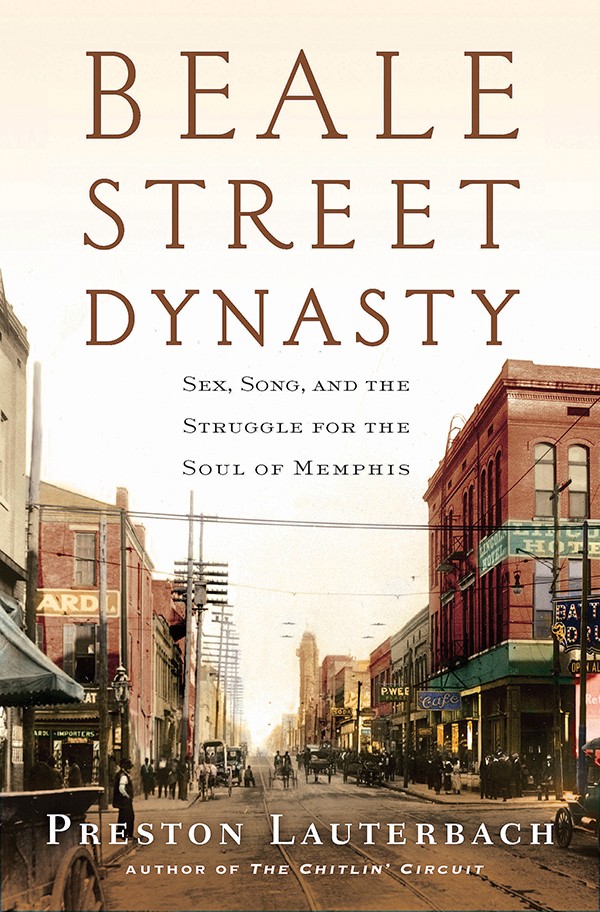Preston Lauterbach called it “a revelation.” The former Memphis magazine staff writer and onetime contributor to the Memphis Flyer was referring to his research into the life of Robert Church Sr., a man who helped make Beale Street the Main Street of black America beginning in the late 19th century and for several decades to follow. Lauterbach, author of The Chitlin’ Circuit and the Road to Rock ‘n’ Roll (2011), tells the story of Church (born to a white father and black mother) and of his son, Robert Church Jr., in the pages of his latest book, Beale Street Dynasty: Sex, Song, and the Struggle for the Soul of Memphis (W.W. Norton), and it’s Beale Street — and the city of Memphis itself — as you probably never knew it or would hardly recognize it.
There were saloons, gambling, music, and brothels on and around Beale, for sure. But the street was a commercial hub too and a center for black newspaper publishing, churchgoing, and political organizing. For many black Americans, it was, in short, “the place to be, the place to get to,” Lauterbach said in a recent phone interview. “It was Harlem 30 years before the Harlem Renaissance. It was vital to national culture.” It was also the key to political power in Memphis and beyond.
“Mr. Crump wouldn’t have been able to build his machine without Beale,” Lauterbach said. “Beale won the state of Tennessee in the 1920 presidential election for the Republican Party! That blows me away.”

As Beale Street Dynasty makes plain, the influence of African-American voters in Memphis — organized through the efforts of Church Sr. and Jr. and right-hand man Lt. George W. Lee — was well recognized by black and white politicians alike, and it worked both ways. According to Lauterbach in his book, “Crump needed votes to get his candidates into office, and Church aimed to help his people.” Both Churches, father and son, did indeed help their people.
It was no paradise for black Memphians, Lauterbach was quick to add in our interview. This was still the period of Jim Crow and lynchings, which were reported on most notably by African-American journalist Ida B. Wells, who started her career on Beale, site of the city’s first black-owned printing press. But it was the black vote that set Memphis apart and made it, in Lauterbach’s words, “unlike virtually every other place in the South.”
“We know Beale is a powerful place,” he said. “It has a reputation, a mystique. But who were the people behind it? We know about Ida B. Wells and W.C. Handy and the music. But what was the ‘backbone’ to Beale history? How do we put all this together?”
Those were questions Lauterbach asked himself when he began looking into Beale Street’s long history. And Beale’s a long way from San Diego, where Lauterbach grew up. It’s his “outsider” status, however, that’s helped him in his 100-year history of Beale, from the Civil War to World War II. There have been previous histories, but none so deeply researched or definitive in the telling.
“I didn’t go into this with an agenda,” Lauterbach said. “You know, Memphis has had its ass kicked in recent decades, we gotta make this look as good as possible for the rest of the world. And no, I don’t have a great-grandfather who owned a cotton firm. But history is so heavy in Memphis that in certain respects it does take an outsider to see it.”
Not quite such an outsider. Lauterbach lives today in Virginia with his wife, Elise (who grew up in Memphis), and their children, but he’s currently a visiting scholar at Rhodes College, so he and his family return to the city regularly. As he said, “We’re all still part-time citizens.”
Thursday, March 19th, is the official launch date of Beale Street Dynasty, and to mark the occasion Lauterbach will be speaking inside Rhodes’ McCallum Ballroom of the Bryan Campus Life Center at 6 p.m., booksigning to follow. For more on Rhodes’ three-day “Beale Street Symposium,” see this week’s Flyer calendar or go to rhodes.edu/bealestreetsymposium.